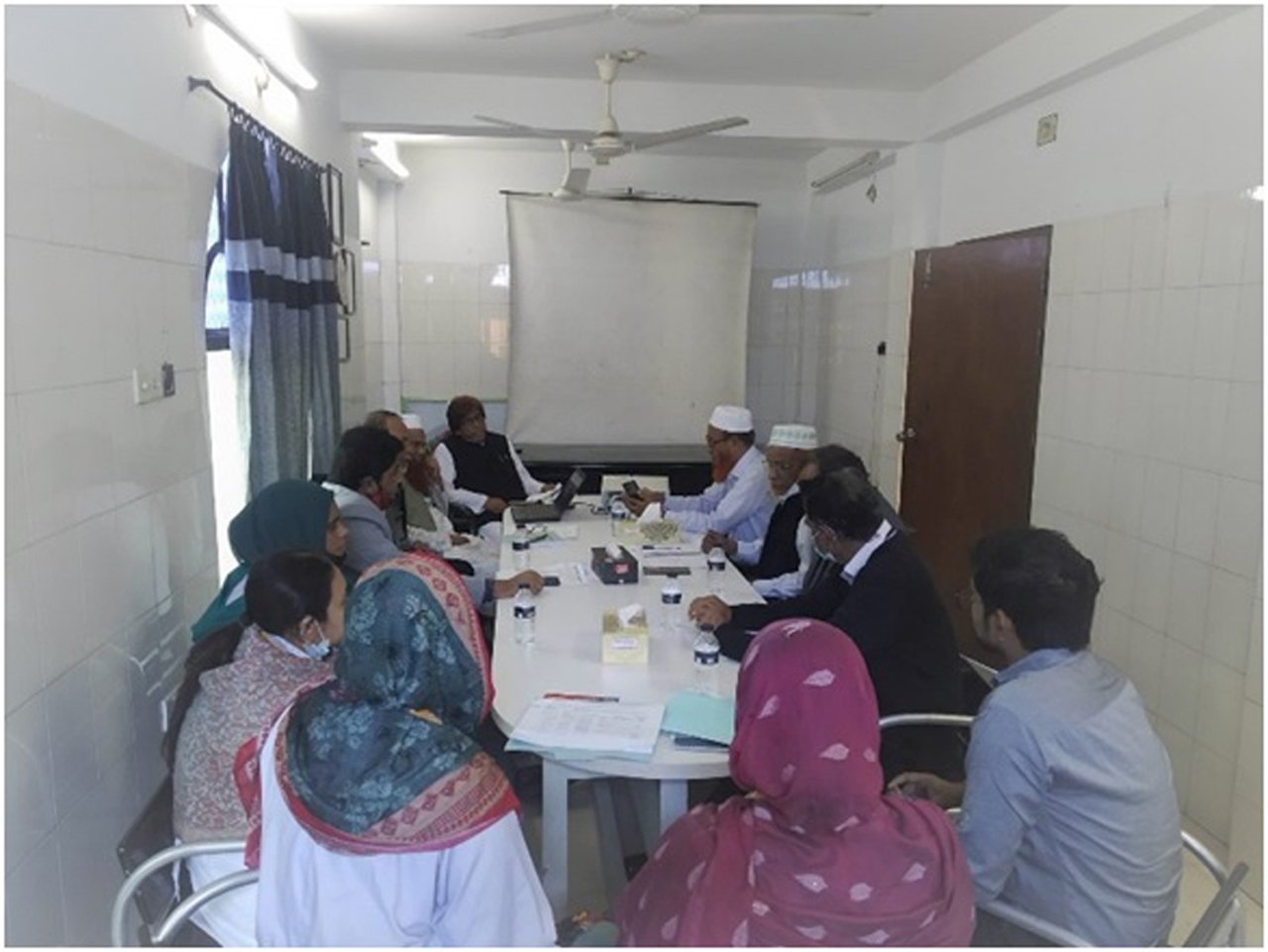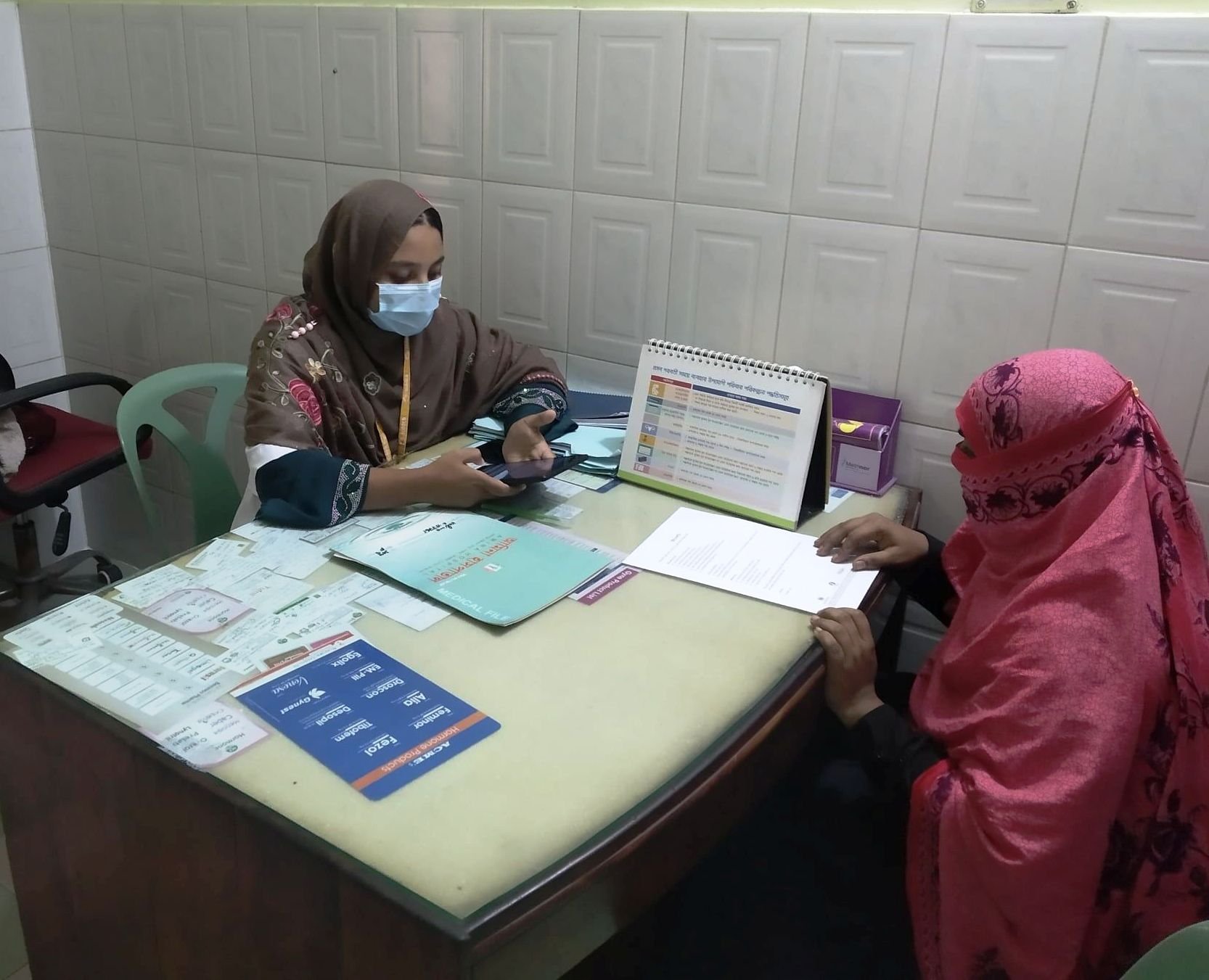Cycle 9 (2020 Deadline)
Engaging the private sector in increasing voluntary use of longa-cting reversible contraceptives and permanent family planning methods in rural areas of Bangladesh
PI: Md. Jasim Uddin (jasim@icddrb.org), International Centre for Diarrhoeal Disease Research, Bangladesh
U.S. Partner: Sian Curtis, University of North Carolina at Chapel Hill
Project Dates: June 2021 - May 2024
Project Overview  | | Review meeting with District and Sub-district level MOHFW and private clinic providers. Photo credit: Dr. Uddin |  | | Counselor’s consultation area. Photo credit: Dr. Uddin |
This PEER project aimed to reduce an unmet need for family planning (FP) services and increase the use of effective contraception among postpartum women in rural Bangladesh through engaging the private clinics at the upazila (sub-district) level. The researchers tested various interventions related to pregnant women and evaluated their effectiveness after 36 months. The private clinics received various types of FP supplies from the local upazila Family Planning Office of the Ministry of Health and Family Welfare (MoHFW) as per a recently introduced policy, and a team consisting of doctors from local public and private facilities and Upazila and District level managers of MoHFW, representatives from the Directorate General of Family Planning (DGFP), and study investigators were involved monitoring the study activities at the private clinics. The researchers sought to develop a mechanism to engage private sector providers to accelerate access to postpartum family planning services which can be scaled up in other areas of Bangladesh.
Final Summary of Project Activities
The project team enrolled 2,360 women from four private clinics in Baraigram and Gurudaspur upazilas of Natore district. Private clinic staff were involved in training on technical and ethical issues involved. The intervention included counseling pregnant women at the clinic on antenatal care (ANC), safe delivery, and postpartum family planning (PP-FP), as well as developing and sending SMS messages to enrolled pregnant women to promote ANC, institutional delivery, and PP-FP after delivery.
The women enrolled received multiple follow-up surveys after delivery. The researchers also collected qualitative data during the reporting period to gather insights into the challenges associated with implementing the interventions, with the goal of refining the strategies used. The team also conducted ten key informant Interviews with service providers of private clinics and MOHFW officials and five in-depth interviews with project counselors and record keepers. Throughout the project, the PEER team organized a monthly review meeting with officials from MOHFW and private clinic providers and met with a variety of stakeholders. To ensure data quality, the team contacted a randomly selected group of 883 out of 2360 recently delivered women (RDW) by phone in intervention and comparison areas, successfully completing 391 interviews to check for any inconsistencies.
The PEER team’s findings included increased use of long-acting reversible contraception (LARC) and permanent methods (PM) among postpartum women in rural Bangladesh. Dedicated counseling during ANC had a significant contribution in increasing LARC/PM use after delivery. The findings showed that a significantly higher proportion of women in the intervention area had at least two or three ANC visits, and 17% of women had 4+ ANC visits which is more than 3 times higher than in the comparison area (5%). Facility delivery was significantly higher in the intervention area, and c-section delivery was significantly lower.
The findings also showed a significantly higher proportion of women in the intervention area used PP-FP compared to those of the comparison area within the three days of facility delivery. Overall contraceptive use among the recent delivered women (RDW) within the 5 months of delivery was significantly higher in the intervention area, and the proportion of women accepting LARC or PM within 5 months of delivery was also significantly higher. All the women who accepted LARC/PM reported that counseling was the key factor in their motivation. Use of behavior change communication materials and SMS communications were mentioned by 68.9% and 56.1% RDWs respectively as motivating factors.
The PEER team has made several recommendations to private clinics and health workers as a result of this project, and the PI received a new grant of $321,541 from the Vaccine Alliance for a different project.
Back to PEER Cycle 9 Grant Recipients
| 




